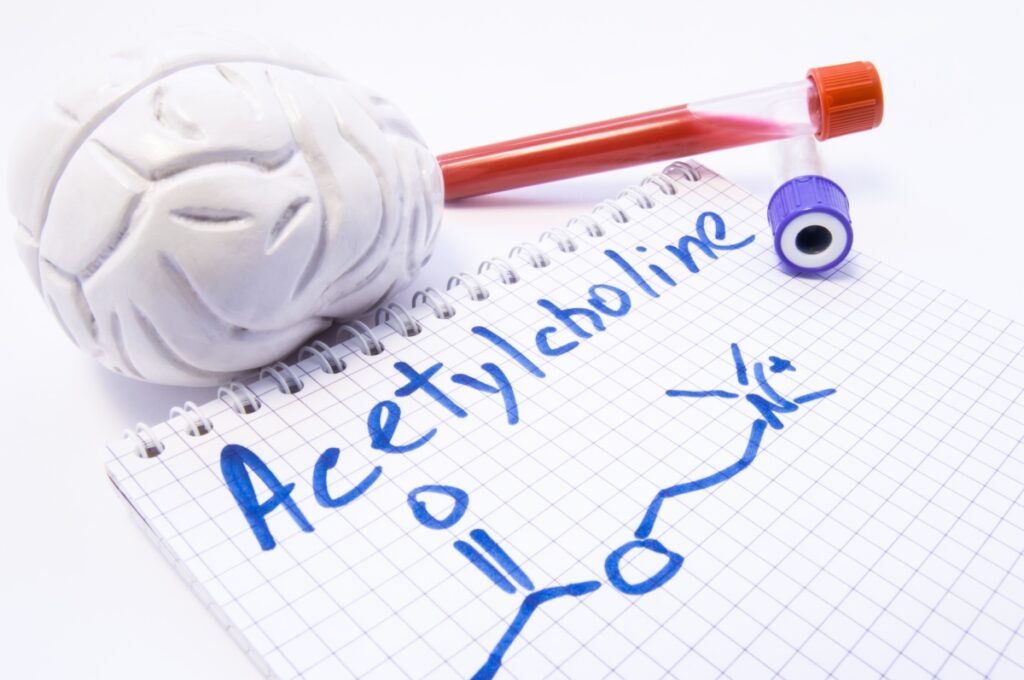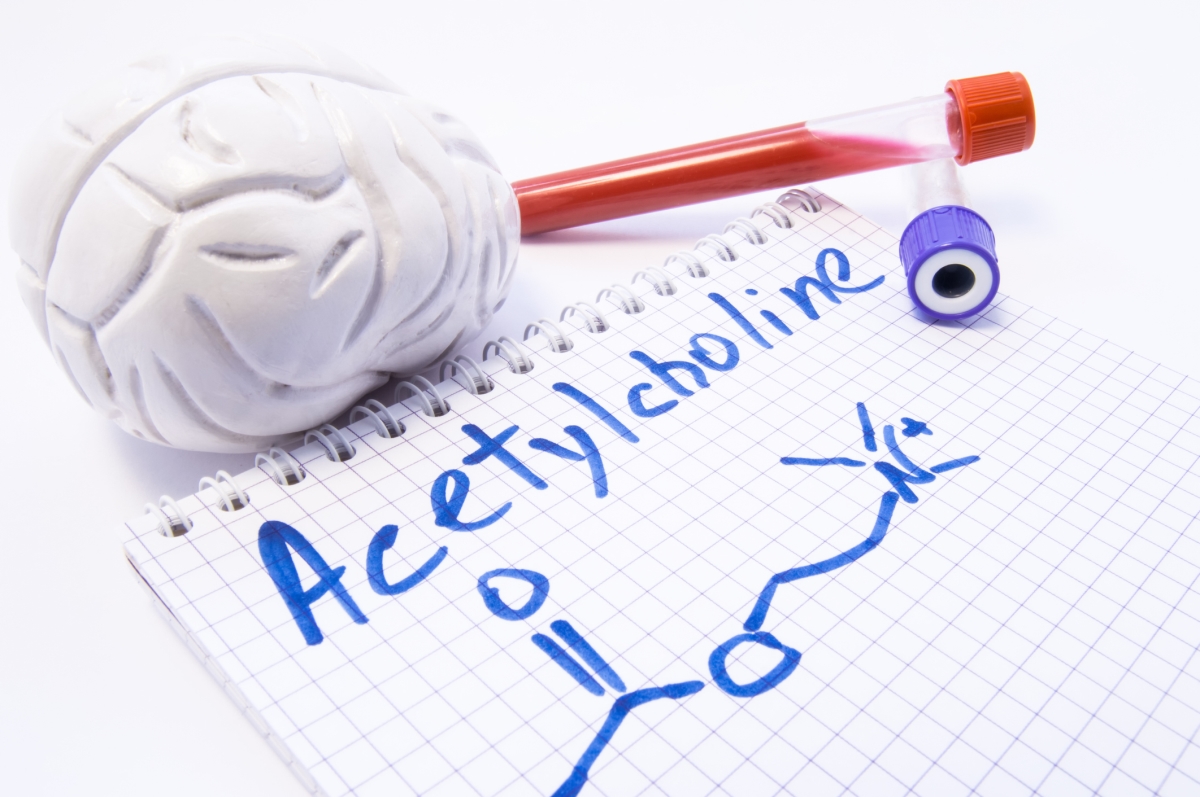What is acetylcholine?

This article is part 1 of a 3-part series:
Part 1: What is acetylcholine and what are its important roles?
Part 2: 7 Signs you could have low brain acetylcholine levels
Part 3: How to boost your brain acetylcholine levels
Acetylcholine is one of the first described neurotransmitters with essential roles in memory and cognitive functions. It also works as intracellular messenger molecules outside of the nervous system, covering various brain and bodily functions. As its name suggests, it refers to a complex chemical structure made of acetic acid and choline.
If a body’s tissues use acetylcholine or respond to its stimuli, they are cholinergic. On the other side, substances that antagonize acetylcholine’s action on tissues are called anticholinergics. The proper communication between cholinergic and anticholinergics is vital for the appropriate function of the brain and other organs.
Important roles of acetylcholine for cognitive performance
Acetylcholine is a ubiquitous chemical in our body and is involved in many cognitive processes, such as:
- Alertness
- Attention and focus
- Memory
- Mood
- Neuroplasticity
- Long-term potentiation
- Creativity
- Verbal fluency
- Vagus nerve tone
- Motivation
- Awareness
- Learning
Acetylcholine acts as both neurotransmitter and neuromodulator in your brain and spinal cord. As a neuromodulator, it controls the magnitude of transmitted nerve signals between neurons, adjusting neuronal excitability, synaptic plasticity, and nerve signal transmissions. Last but not least, acetylcholine also coordinates the firing of neurons.
If you have low acetylcholine, you may experience problems with some aspects of cognitive functions that require acetylcholine as mentioned above. Therefore, you want to understand how to keep acetylcholine at optimal levels. But, let’s first briefly review how it affects mental processes.
Alertness
Acetylcholine regulates alertness and the sleep-wake cycle. It interacts with other stimulating neurotransmitters and hormones like dopamine, histamine, and norepinephrine to stimulate wakefulness. Cholinergic activities increase during alertness and waking and decrease during certain sleep stages.
Attention and focus

Acetylcholine is not only important in learning and memory, but also in stimulating attention and alertness.
In a rat study, putting them in a situation that required focus significantly increased acetylcholine in the brain. Furthermore, making the task more difficult or distracting the rats further increased the acetylcholine levels. The study concluded effort to sustain attention increases brain acetylcholine levels.
In a clinical study involving 60 healthy females, citicoline supplements, which increased acetylcholine, improved their focus.
Memory
Higher intakes of acetylcholine precursor or supplements that prevent acetylcholine breakdown may help people facing memory issues.
Acetylcholine has a long association with memory and cognitive function. Significant loss of acetylcholine in aging, along with the development of dementia, leads to impairments of memory. Acetylcholinesterase inhibitors, which stop acetylcholine breakdown, have shown significant benefits for memory and Alzheimer’s disease severity.
In rats, lifetime supplementation with choline significantly improved their memory and prevented the formation of amyloid-beta plaques, a protein linked to Alzheimer’s disease.
In a clinical study involving 2,195 elderly men and women, individuals with higher blood choline levels had better learning and memory performance.
The hippocampus is your brain’s memory center. Whereas, your cerebral cortex is responsible for higher-order brain functions such as sensory, perception, memory, association, thoughts, and reasoning. In monkeys, a disrupted supply of acetylcholine in these two brain regions impaired their memory and ability to acquire new information. These symptoms were similar to human amnesia (memory loss).
There is a hypothesis that depleting acetylcholine may lead to neurodegenerative diseases like dementia and Alzheimer’s disease. However, it’s still unclear which is the cause or the effect.
Mood

The neurotransmitter serotonin is most commonly associated with depression and other mood disorders. However, there is evidence that other neurotransmitters, including acetylcholine, may also play a role in these conditions.
Clinical studies suggest excess acetylcholine in some regions of the brain may be a reason for low mood. Therefore, we can conclude the cholinergic system has been significantly linked with mood regulation.
Although its role in depression is not well established, reports show drugs blocking nicotinic acetylcholine receptors have antidepressant effects in rodents. Additionally, the same drugs helped with depression symptoms in humans if used in combination with more traditional antidepressants.
More studies are required on acetylcholine and mood, as the cause-effect relationship has not been well established yet. More precisely, the fact that high levels of acetylcholine have been linked to depression does not mean that too much acetylcholine causes depression. Also, high levels of acetylcholine most likely are not the only cause of depression, but only a small part of a more complex system.
Neuroplasticity
Neuroplasticity refers to your nervous system’s ability to change, modify, and adapt in response to stimuli and challenges. These changes could be structural or functional and may happen at any age.
Researchers used to think that the brain only grows and adapts during childhood. However, newer research shows many brain aspects can change, even in adulthood.
On the level of one nerve cell (neuron), there is synaptic plasticity. Synaptic plasticity is the adaptation of synapses (neuronal connections) to store new information and memories. Acetylcholine plays a central role in this process.
Long-term potentiation
Long-term potentiation (LTP) is one of the mechanisms underlying learning and memory. It is how your brain responds to stimuli and adapts according to experience. The more often you use a certain neuronal pathway or cognitive skills, the stronger or more potentiated their synapses become.
In rats, acetylcholine lowered the threshold for long-term potentiation in the hippocampus (the brain’s memory center). Nicotine activates a type of acetylcholine receptor called the nicotinic acetylcholine receptor. In mice, administering nicotine, which activates the nicotinic acetylcholine receptor, induced long-term potentiation.
Creativity

Although there are no studies directly linking creativity to the levels of acetylcholine in the brain, we may connect the whole story with sleeping.
During the rapid eye movement (REM) sleep, we experience the activation of various parts of the neocortex. The neocortex is a set of brain layers responsible for higher-order brain functions such as cognition, spatial reasoning, language, etc.
REM sleep is when acetylcholine floods the brain and disrupts the connection between the neocortex and hippocampus, placing both in a flexible state, enabling neurons to be more easily formed and strengthened. This allows the neocortex to search for similarities between unrelated things and concepts, which may contribute to creativity, memory, and learning.
Many aspects of creativity require holding different thoughts in your memory. Therefore, you need to have a well-functioning brain with healthy levels of acetylcholine to be creative, even though acetylcholine doesn’t work directly in creativity.
Verbal fluency
An observational study on 1,391 subjects searched for a correlation between dietary choline intake, brain morphology, and cognitive function. Results show better visual and verbal memory performance in patients with a higher choline intake.
Also, a small-scale clinical trial on healthy male subjects tested whether the daily supplementation of 500-1,000 mg of dietary choline improves verbal memory, verbal fluency and working memory. The choline supplement only improved these aspects of cognitive function in subjects whose baseline cognitive performance was below average. This means subjects with average cognitive performance did not benefit from supplementation. Moreover, high-performing subjects had worse cognitive function after supplementation.

Memory and learning performance significantly decline in neurodegeneration. The cholinergic system is the main target in the clinical manifestation of mild cognitive impairment (MCI) and hippocampal degradation. A clinical study aimed to better understand how the cholinergic system contributes to episodic memory dysfunctions in MCI. The authors examined the functional and structural integrity of the cholinergic system in 20 MCI patients and 20 healthy controls. Neither structural nor functional changes in the cholinergic system were significantly associated with verbal episodic memory in MCI patients. Instead, only hippocampal volume affected the verbal episodic memory. This concludes that episodic memory dysfunction results primarily from hippocampal neurodegeneration, which is why cholinergic treatments don’t help with verbal fluency among MCI patients.
However, the research on this topic is still early, and more studies are required to confirm the evidence.
Vagus nerve tone
The vagus nerve is an essential anti-inflammatory nerve that uses acetylcholine. The nerve is the longest nerve in the body and connects your brain to your heart, lungs, gut, and other vital organs.
The vagus nerve affects our breathing, digestion, and heart rate, which can influence our mental health. However, you need to pay attention to the tone of the vagus nerve, which is the strength of the vagus nerve signal. Higher vagal tone stimulates the parasympathetic nervous system, which helps our body relax and recover faster after stress.
Low vagus nerve tone is correlated with the incidences of inflammatory diseases, including inflammatory bowel disease (IBD). IBD may worsen due to reduced vagus nerve activity.
There are FDA-approved electrical devices that stimulate the vagus nerve, used to treat depression and epilepsy. However, there are more natural ways to stimulate the vagus nerve.:
- Socializing and laughing
- Deep and slow breathing
- Gargling
- Humming
- Singing
- Chanting
- Cold exposure
- Meditation
- Massage
- Exercising
Roles of acetylcholine outside the brain

Besides the brain, acetylcholine has its roles in other parts of the body, as follows:
- It controls muscle contractions as the primary neurotransmitter in neuromuscular junctions, the synapses (connections) between motor neurons in the spinal cord and muscles. Therefore, acetylcholine is important in activating muscle contractions.
- It controls autonomic function as part of the autonomic nervous system. It regulates cardiac contractions and blood pressure, glandular secretions, and other physiological functions of various organ systems.
- It works as communication messengers between T cells in the immune system.
Conclusion:
Acetylcholine is important for many cognitive and bodily functions. Healthy levels of acetylcholine are important for memory, alertness, focus, verbal fluency, etc., and vagus nerve stimulation. Outside the brain, it controls muscle contractions, blood pressure regulation, inflammation, immune responses, and more.
References
- Akaike A, Izumi Y. Overview. In: Nicotinic Acetylcholine Receptor Signaling in Neuroprotection. Springer Singapore; 2018:1-15.
- Sam C, Bordoni B. Physiology, Acetylcholine. In: StatPearls [Internet]. StatPearls Publishing; 2021.
- Ferreira-Vieira TH, Guimaraes IM, Silva FR, Ribeiro FM. Alzheimer’s disease: Targeting the cholinergic system. Curr Neuropharmacol. 2016;14(1):101-115. doi:10.2174/1570159×13666150716165726
- Picciotto MR, Higley MJ, Mineur YS. Acetylcholine as a neuromodulator: cholinergic signaling shapes nervous system function and behavior. Neuron. 2012;76(1):116-129. doi:10.1016/j.neuron.2012.08.036
- Newman EL, Gupta K, Climer JR, Monaghan CK, Hasselmo ME. Cholinergic modulation of cognitive processing: insights drawn from computational models. Front Behav Neurosci. 2012;6:24. doi:10.3389/fnbeh.2012.00024
- Watson CJ, Baghdoyan HA, Lydic R. Neuropharmacology of sleep and wakefulness. Sleep Med Clin. 2010;5(4):513-528. doi:10.1016/j.jsmc.2010.08.003
- Jones BE. From waking to sleeping: neuronal and chemical substrates. Trends Pharmacol Sci. 2005;26(11):578-586. doi:10.1016/j.tips.2005.09.009
- Klinkenberg I, Sambeth A, Blokland A. Acetylcholine and attention. Behav Brain Res. 2011;221(2):430-442. doi:10.1016/j.bbr.2010.11.033
- Himmelheber AM, Sarter M, Bruno JP. Increases in cortical acetylcholine release during sustained attention performance in rats. Brain Res Cogn Brain Res. 2000;9(3):313-325. doi:10.1016/s0926-6410(00)00012-4
- McGlade E, Locatelli A, Hardy J, et al. Improved attentional performance following citicoline administration in healthy adult women. Food Nutr Sci. 2012;03(06):769-773. doi:10.4236/fns.2012.36103
- Ridley RM, Murray TK, Johnson JA, Baker HF. Learning impairment following lesion of the basal nucleus of Meynert in the marmoset: modification by cholinergic drugs. Brain Res. 1986;376(1):108-116. doi:10.1016/0006-8993(86)90904-2
- Hasselmo ME, Bower JM. Acetylcholine and memory. Trends Neurosci. 1993;16(6):218-222. doi:10.1016/0166-2236(93)90159-j
- Velazquez R, Ferreira E, Knowles S, et al. Lifelong choline supplementation ameliorates Alzheimer’s disease pathology and associated cognitive deficits by attenuating microglia activation. Aging Cell. 2019;18(6):e13037. doi:10.1111/acel.13037
- Tabassum S, Haider S, Ahmad S, Madiha S, Parveen T. Chronic choline supplementation improves cognitive and motor performance via modulating oxidative and neurochemical status in rats. Pharmacol Biochem Behav. 2017;159:90-99. doi:10.1016/j.pbb.2017.05.011
- Nurk E, Refsum H, Bjelland I, et al. Plasma free choline, betaine and cognitive performance: the Hordaland Health Study. Br J Nutr. 2013;109(3):511-519. doi:10.1017/S0007114512001249
- Anand KS, Dhikav V. Hippocampus in health and disease: An overview. Ann Indian Acad Neurol. 2012;15(4):239-246. doi:10.4103/0972-2327.104323
- Strominger NL, Demarest RJ, Laemle LB. Cerebral Cortex. In: Noback’s Human Nervous System, Seventh Edition. Humana Press; 2012:429-451.
- Easton A, Ridley RM, Baker HF, Gaffan D. Unilateral lesions of the cholinergic basal forebrain and fornix in one hemisphere and inferior temporal cortex in the opposite hemisphere produce severe learning impairments in rhesus monkeys. Cereb Cortex. 2002;12(7):729-736. doi:10.1093/cercor/12.7.729
- Francis PT, Palmer AM, Snape M, Wilcock GK. The cholinergic hypothesis of Alzheimer’s disease: a review of progress. J Neurol Neurosurg Psychiatry. 1999;66(2):137-147. doi:10.1136/jnnp.66.2.137
- Dulawa SC, Janowsky DS. Cholinergic regulation of mood: from basic and clinical studies to emerging therapeutics. Mol Psychiatry. 2019;24(5):694-709. doi:10.1038/s41380-018-0219-x
- Shytle RD, Silver AA, Lukas RJ, Newman MB, Sheehan DV, Sanberg PR. Nicotinic acetylcholine receptors as targets for antidepressants. Mol Psychiatry. 2002;7(6):525-535. doi:10.1038/sj.mp.4001035
- Andreasen JT, Olsen GM, Wiborg O, Redrobe JP. Antidepressant-like effects of nicotinic acetylcholine receptor antagonists, but not agonists, in the mouse forced swim and mouse tail suspension tests. J Psychopharmacol. 2009;23(7):797-804. doi:10.1177/0269881108091587
- Bacher I, Wu B, Shytle DR, George TP. Mecamylamine – a nicotinic acetylcholine receptor antagonist with potential for the treatment of neuropsychiatric disorders. Expert Opin Pharmacother. 2009;10(16):2709-2721. doi:10.1517/14656560903329102
- Voss P, Thomas ME, Cisneros-Franco JM, de Villers-Sidani É. Dynamic brains and the changing rules of neuroplasticity: Implications for learning and recovery. Front Psychol. 2017;8:1657. doi:10.3389/fpsyg.2017.01657
- Leuner B, Gould E. Structural plasticity and hippocampal function. Annu Rev Psychol. 2010;61(1):111-140, C1-3. doi:10.1146/annurev.psych.093008.100359
- Rakic P. Neurogenesis in adult primate neocortex: an evaluation of the evidence: Progress. Nat Rev Neurosci. 2002;3(1):65-71. doi:10.1038/nrn700
- Ovsepian SV, Anwyl R, Rowan MJ. Endogenous acetylcholine lowers the threshold for long-term potentiation induction in the CA1 area through muscarinic receptor activation: in vivo study. Eur J Neurosci. 2004;20(5):1267-1275. doi:10.1111/j.1460-9568.2004.03582.x
- Matsuyama S, Matsumoto A, Enomoto T, Nishizaki T. Activation of nicotinic acetylcholine receptors induces long-term potentiation in vivo in the intact mouse dentate gyrus: Nicotine induces LTPin vivoin mouse dentate gyrus. Eur J Neurosci. 2000;12(10):3741-3747. doi:10.1046/j.1460-9568.2000.00259.x
- Lodato S, Arlotta P. Generating neuronal diversity in the mammalian cerebral cortex. Annu Rev Cell Dev Biol. 2015;31(1):699-720. doi:10.1146/annurev-cellbio-100814-125353
- Lui JH, Hansen DV, Kriegstein AR. Development and evolution of the human neocortex. Cell. 2011;146(1):18-36. doi:10.1016/j.cell.2011.06.030
- Poly C, Massaro JM, Seshadri S, et al. The relation of dietary choline to cognitive performance and white-matter hyperintensity in the Framingham Offspring Cohort. Am J Clin Nutr. 2011;94(6):1584-1591. doi:10.3945/ajcn.110.008938
- Knott V, de la Salle S, Choueiry J, et al. Neurocognitive effects of acute choline supplementation in low, medium and high performer healthy volunteers. Pharmacol Biochem Behav. 2015;131:119-129. doi:10.1016/j.pbb.2015.02.004
- Peter J, Lahr J, Minkova L, et al. Contribution of the cholinergic system to verbal memory performance in mild cognitive impairment. J Alzheimers Dis. 2016;53(3):991-1001. doi:10.3233/JAD-160273
- Ji H, Rabbi MF, Labis B, Pavlov VA, Tracey KJ, Ghia JE. Central cholinergic activation of a vagus nerve-to-spleen circuit alleviates experimental colitis. Mucosal Immunol. 2014;7(2):335-347. doi:10.1038/mi.2013.52
- Breit S, Kupferberg A, Rogler G, Hasler G. Vagus nerve as modulator of the brain–gut axis in psychiatric and inflammatory disorders. Front Psychiatry. 2018;9. doi:10.3389/fpsyt.2018.00044
- Fallis J. How to stimulate your vagus nerve for better mental health —. Optimal Living Dynamics. Published September 2, 2021. Accessed December 17, 2021. https://www.optimallivingdynamics.com/blog/how-to-stimulate-your-vagus-nerve-for-better-mental-health-brain-vns-ways-treatment-activate-natural-foods-depression-anxiety-stress-heart-rate-variability-yoga-massage-vagal-tone-dysfunction
- Waxenbaum JA, Reddy V, Varacallo M. Anatomy, autonomic nervous system. In: StatPearls [Internet]. StatPearls Publishing; 2021.
